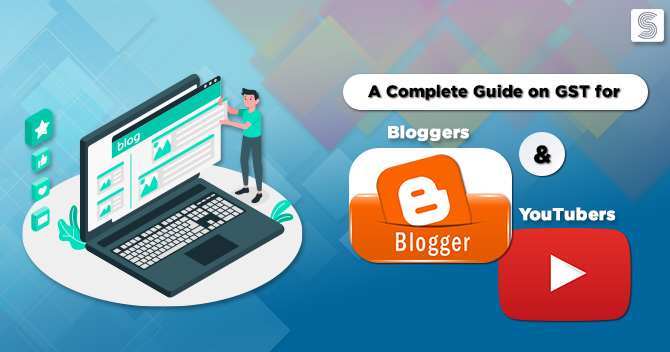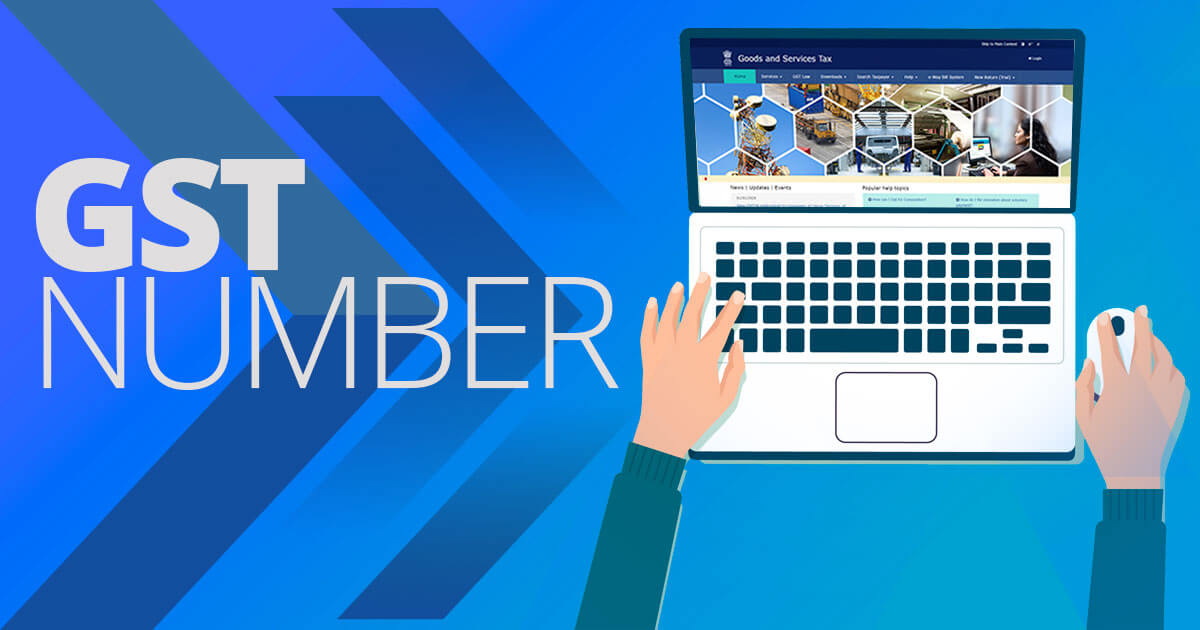A Complete Guide on GST for Bloggers & YouTubers

Dashmeet Kaur | Updated: May 14, 2020 | Category: GST
Indian Taxation System has consistently evolved ever since Goods and Service Tax rolled out in India. Due to the peculiar nature of GST, its applicability is still obscure to many new-age businesses. Amidst several other contemporary career fields, the Bloggers and YouTubers have made a prominent mark. The biggest speculation in this profession is how to file GST? This write-up will provide comprehensive knowledge about the various criteria to file GST for Bloggers and YouTubers. It shall also be applicable for other freelancers like developers, graphic designers, writers, etc.
Table of Contents
GST Levied on the Services Provided by Bloggers in India
GST had a different impact on different industries. It took a while for the people to understand GST applicability on their businesses and profession. In case of Blogger and YouTubers, they are considered as the supplier of services. Bloggers render a platform to the advertisers for displaying their advertisement, which denotes a supply of service.
GST of 18% is levied on the services that fall under blogging, marketing, and other freelancing services if that is provided within the economic boundaries of India. The tax shall be collected from the respective clients and deposited to the Government of India.

When the supplier and client both belong to the same State, then the classification of GST is done in the following way:
- CGST @ 9%
- SGST @ 9%
However, the overall GST for Bloggers remains to be 18% (9% CGST +9% SGST), which will be paid to the Central and State Governments separately.
Tax Exemptions given to the Bloggers
Bloggers, YouTubers, and Freelancers are exempted from GST Registration or to pay GST if the total turnover of their services is less than Rs. 20 Lakhs per annum. Besides, the threshold limit is reduced to Rs. 10 Lakhs for the service of suppliers of the following states:
- Assam
- Arunachal Pradesh
- Manipur
- Jammu &Kashmir
- Meghalaya
- Nagaland
- Mizoram
- Tripura
- Sikkim
- Uttrakhand
- Himachal Pradesh
While the threshold limit for GST Registration of other states, service suppliers is Rs. 20 Lakhs.
What is the need to register GST for Bloggers?
Below factors determine the importance of Goods and Service Tax for YouTubers and Bloggers:
- When the turnover exceeds the upper limit- GST Registration is mandatory if the annual income of a Blogger, YouTuber, or Freelancer exceeds the upper limit of Rs. 20 Lakhs. The threshold limit of such service is prescribed under the GST Bill, while the limit changes to Rs. 10 Lakhs for some states mentioned above.
- Inter-State Supply- GST is compulsory for any individual who supplies interstate services. If a Blogger or Freelancer provides services outside his/her State, then he/she becomes liable to register under GST. Registration is imperative regardless of the amount transacted against such services.
- Earning outside of India- As per Section 24 of the Central Goods and Service Act, 2017, if a Blogger or Freelancer receives international payment, then he needs to have GSTIN. The Goods and Services Tax Identification Number is mandatory for receiving payments from foreign countries.
Requisites for GST Registration for YouTubers and Bloggers
Bloggers, YouTubers, or Freelancers are required to provide some set of information about their business for GST Registration. It includes business information, personal details and other details about the business premises. Let us have an extensive understanding of the requirements to register for Goods and Service Tax:
- Business Information- A Blogger is required to provide details about the business, such as turnover, business operations, etc. Also, the applicant has to specify the coverage service areas, which includes if the services are provided within the State, Interstate, or to a foreign entity.
- Personal Details- Here is the list of personal information that a Blogger must provide while registering for GST:
- Name and address of the applicant
- Date of birth (DOB) of the applicant
- A recent photograph of the Blogger or YouTuber
- PAN card
- Mobile number and Email ID
- Detailed Information on the Business Premises- The applicant Blogger, YouTuber, or Freelancer needs to submit complete information about their business premises (residential address).
Criteria to File GST for Bloggers
Bloggers that earns revenue lower than INR 20 Lakh a year are not required to pay GST, but the ones whose income exceeds the upper limit needs to pay 18% GST.
Bloggers have to file 3 returns each month in the State in which they have registered. The first return is levied for revenue, where the GST liability must be reported. The second return is charged for expenses, where the Blogger can claim credit for all the expenses paid, such as rent incurred in the business. The third and last return implies to the Net GST Liability, which is equivalent to GST liability minus GST credit that equals net tax.
Bloggers or YouTubers that are uncertain whether they will be able to earn revenue of INR 20 lakh a year can still charge GST from their clients. In case, the Blogger doesn’t make that much revenue, the money shall be credited back to the clients.
It is suggested that the Bloggers should register for GST by raising relevant GST invoices; thereby, they do not have to carry the risk of not paying the taxes. Moreover, it entitles the customers to claim credit for GST.
The interest rate of GST for Bloggers is 18 % for both local and interstate transactions. It differs only in the technical aspect of invoicing. For instance, the Bloggers have to raise an Integrated GST or IGST for interstate transactions. Whereas, for the local transactions, the Bloggers have to raise both Central (CGST) and State (SGST) invoices, at 9% each.
How can Bloggers register under GST in India?
The procedure of GST Registration for Bloggers is similar to any other service provider. The applicant has to provide PAN card details along with phone number and email to receive a Taxpayer Registration Number. Once the TRN is generated, the applicant should submit the following information:
- Blogger applying for GST Registration is required to fill in the business details. Here are the conditions under which the registration is mandatory:
- Crossing the threshold limit (above INR20 lakhs)
- Interstate supply of services (between 2 states)
- Voluntary
- Next is to provide personal information such as address, name, DOB, etc. Also, the applicant is required to affix his/her photograph, along with the details. Ensure that all the provided information is valid and authentic as any incorrect information may result in application rejection.
- Unlike other service providers, the Bloggers have to provide the details of their residential address as the business address. Since the Bloggers usually work from their home and do not have separate office premises.
- A blogger has to provide his/her personal bank account details as they are the proprietors.
Penalties for Non-Filing of GST
The non-payment of GST is also considered as an offence under the GST Bill. Therefore, if a Blogger or Freelancer does not register for GST or file timely GST returns, then he/she shall be responsible to pay penalties. Below are the penalties imposed under the GST Bill:
- Penalty for not registering for GST– INR 10000
- Penalty for not filing the GST Returns– INR 100 per day
Conclusion
To sum up, one can say that GST for Bloggers, YouTubers and Freelancers is legally obligated in some cases while others are exempted from it. Filing of GST is a daunting task that must be done under the guidance of legal experts.
A reliable option for you can be Swarit Advisors. Having core experience in GST Registration, our experts can streamline the process of filing returns. So do not procrastinate further and consult our team as non-filing of GST return is an offence, and you will be liable to pay penalties.
Also, Read: Impact of GST on Start-ups.














